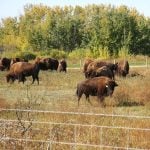How can the treaty rights of Indigenous peoples be honoured in a way that gives them a proper seat at the table when it comes to farming in Canada?



The grassroots organization has expanded since it began in 2018





A corn maze commemorating the lost children is a place to reflect and remember

The File Hills Colony near Balcarres, Sask. epitomized everything that was wrong about colonial attitudes towards Indigenous peoples. But new models for Indigenous agriculture are emerging

Finding a new way of living together is key to the future of rural Canada

First Nations communities are working with several ag and environmental organizations on a Living Lab in north-central Saskatchewan